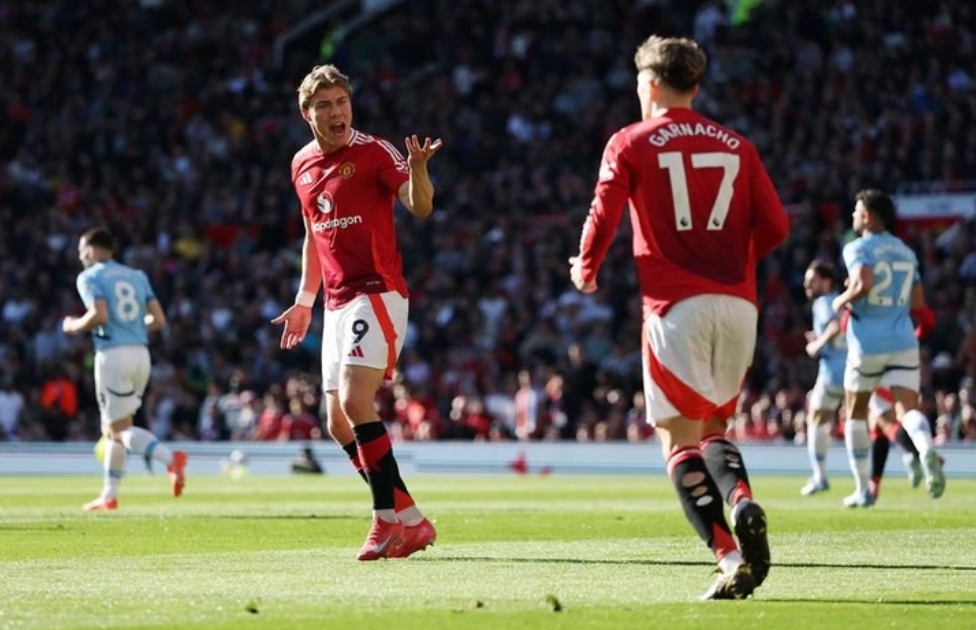Manchester United are still using six-year-old tactic to trouble Man City - but Ruben Amorim has a plan

Man United had the better chances at Old Trafford but a forgettable contest against Manchester City got the result it deserved.
United endured another frustrating day in front of goal at Old Trafford
Maybe there will come a time when Manchester United stop being a counter-attacking team, but for now Ruben Amorim is having to lean into an approach that has become the go-to tactical blueprint for Old Trafford bosses.
Every new man steps into the dugout with designs of upgrading this side into one capable of dominating matches technically, but that is easier said than done. United still thrive in the open spaces of transitions and turnovers. Give them the ball with a set defence to break down and they are unlikely to find an answer.
On derby day, United are still playing under Ruben Amorim as they played under Ole Gunnar Solskjaer. If anything, Solskjaer's squad was even better equipped to strike on the break, which is why his record against Pep Guardiola was so good.
Amorim had won both of his previous meetings with Guardiola this season but the more instructive one was probably the success with former club Sporting in the Champions League in November. They rode their luck in the first 35 minutes but ended up winning 4-1.
The day after, one United employee remarked that it had reminded them of how Solskjaer would set up against City. It was a masterclass in transitions. Defending deep and waiting for your moment to spring forward. Led by Viktor Gyokeres, Sporting were ruthless when they had the chance to pick City apart and expose the kind of flaws other teams have since taken advantage of.
After that win, having already agreed to take over at Old Trafford, Amorim suggested he couldn't replicate those tactics to bring success to United.
“What I can tell you is that this doesn't mean anything in particular - don't take anything from this," he said. "We cannot transport one reality to another. Manchester United cannot play the way we play and we will have to adapt.”
Amorim meant that United couldn't be as reactive as Sporting were that night, but that is exactly what they have become. Or rather, it is what they remain. It's been a long time since United were a team that felt comfortable in possession and could control games.
It's not necessarily the wrong approach. United were excellent in the second half against Arsenal when the game was set up for them to play that way, having been given the lead by Bruno Fernandes' brilliant free-kick. They had their chances against City to win this game, and if either side deserved it, it was probably the hosts.
The first half was forgettable for its lack of quality but also its predictability. The game followed a familiar pattern. City would enjoy a long spell of territory and the game would go to sleep for seven or eight minutes, with United's five-man defence easily soaking up the pressure, while Guardiola's side continued to turn the ball over too often.
Then, all of a sudden, United would win the ball in a promising position and spring into life. They played some sharp stuff on the break but those moments were all too rare. Patrick Dorgu took a heavy touch in a promising position and Alejandro Garnacho failed to connect with a headed chance.
Too often, United would win the ball, often through Manuel Ugarte's work, but then attack with only three players. Dorgu and Diogo Dalot defended so deep that it left them lots of ground to cover to get into the final third. Others needed to hold possession to give them time to turn it into a five-man attack.
But the idea of playing in the transition is to go for goal quickly. When Fernandes or Garnacho got on the ball they wanted to go for goal.
They did carry a greater threat in the final third, however. Joshua Zirkzee forced Ederson into a second half save after one smart move and as City faded, it was Amorim's side who finished with a flurry. But in truth a goalless draw was just about the correct outcome.
Amorim knows he needs to add more to United's play. On Friday he talked hopefully of challenging for the title as soon as next season, reluctant to admit that this might be a long journey. But counter-attacking teams rarely win the Premier League in the modern era and so if United are to end up top of the pile again finally, someone will need to teach them to control games and offer a wider variety to their play.



0 Comments